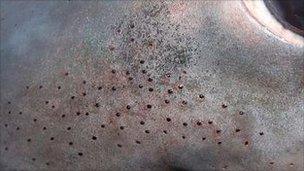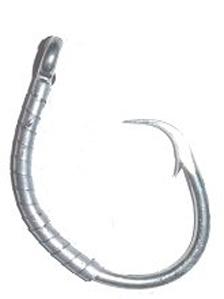Shark attacks: A magnetic solution?
- Published
Eric Stroud and colleague demonstrate the effect of magnetised rare earth metals on a lemon shark. Video courtesy of PRI's The World
An American chemist says he's found a substance - several, in fact - that can repel some of the most fearsome predators in the ocean. He wants to use his discovery to protect them, and us.
Eric Stroud stands on a pier on the island of North Bimini in the Bahamas. He looks down into the turquoise water.
A couple of eagle rays and barracudas swim by.
"The current is ripping through here right now," he says. "The tide is going out. So any scent that's put here goes right to the outside of the channel, and that's where the big sharks are right now."
Stroud is setting up an experiment. He unwraps 20lbs (9kgs) of frozen sardines, drops them into a mesh bag tied to the pier, and tosses the bag into the water. He's hoping to attract a large bull shark.
"It's a fairly dangerous shark," he explains. "It can be aggressive, especially when provoked or cornered."
If a bull shark does turn up, he'll throw a large baited hook into the water. But it's not your typical fishhook. In fact, if all goes well, this hook won't catch any sharks.
For more than a decade, Stroud has been working to develop shark repellents.

The Ampullae of Lorenzini: Jelly-filled pores on a shark's snout that sense electricity
He used to work as a chemist in the pharmaceutical industry. Then, in the summer of 2001, he and his wife went on a cruise to Bermuda.
"We hit bad weather, and we were trapped in a cabin, and on the news was shark bite after shark bite," he says. "It seemed like everyone that stepped in the ocean in Florida was getting attacked by a shark that summer."
That's when his wife suggested he turn his talents to developing shark repellents. When they got home to New Jersey, he set up several small pools in his basement, and filled them with small sharks.
He watched how the sharks fed, swam, and behaved. Then, one day, he accidentally dropped a large magnet from his workbench. He noticed some small nurse sharks dart away.
"That night, we put magnets into the water and couldn't believe the nurse sharks were extremely distressed and stayed away from them," he says.
Stroud thinks that was the moment he discovered that magnets repel sharks.
He demonstrates the effect at the Bimini Biological Field Station in the Bahamas. He stands waist-deep in water, just offshore, in a fenced-in pen in the sea. Several young Lemon sharks glide around the perimeter. One of Stroud's assistants captures one of them and slowly rotates it onto its back underwater. This puts the shark into a sleep-like state.
Then Stroud takes a magnet and spins it as he moves it towards the shark. The shark darts away suddenly. "There you go," he says. "Look at that beautiful bend away from the magnet like he's repelled by it".
Sharks possess electrical sensors, called the ampullae of Lorenzini, that look like tiny freckles on their snouts. Biologists believe sharks use these sensors to detect the heartbeats of their prey and to navigate using the Earth's magnetic field.

Eric's "smart hook" is magnetised and wrapped with a magnesium alloy foil
Stroud suspects the spinning magnet overwhelms these electrical sensors.
"It's probably something like a bright flashlight across your eyes," he says. "It's just temporarily blinding, and you're startled. And it's not pleasant."
Other shark experts believe magnets could have a potential use but it's too early to say.
Rob Lawrence, who has been working with great white sharks for more than 20 years and takes tourists in Cape Town cage diving, says: "It could work if a lot more research was done on this.
"Sharks have a lot of sensory organs in their snout so potentially the magnetic field could affect it.
"But people here in South Africa have looked into this and there hasn't been much success with it."
Geremy Cliff, head of research at KwaZulu-Natal Sharks Board, says an Australian study in 2009 suggested that magnets can repel five shark species, while they have little effect on one teleost (bony fish) species in a test tank environment.
"But the authors had raised concerns that the size and weight of the magnets was considerable and that many would be needed to keep sharks out of nets," he adds.
Stroud says other ocean species don't appear to be affected by magnets. "Bony fish, like tuna or swordfish, do not have this special organ. Therefore, they are not affected at all in the presence of magnets or metals."
He says the same is true for eels, invertebrates, and crabs. "We have not tested this on sea turtles - which, like sharks, use the Earth's magnetic field as a compass - but some early work by other researchers indicates they have no effect."
Stroud made his discovery in 2004. It helped him jumpstart a company he'd founded called SharkDefense, that aims to develop and commercialise shark repellents.
He and his team tested other substances, and they found that some metals also interfere with a shark's electrical sensors. "Certain metals didn't work, others did", says Stroud. "You begin to hone down the periodic table".
Particularly effective are rare-earth metals like samarium, neodymium, and praseodymium.
His team are also in the process of <link> <caption>testing various chemical shark repellents</caption> <url href="http://www.theworld.org/2012/04/repel-sharks/#video2" platform="highweb"/> </link> .
Other deterrent products using electronic waves to deter sharks are already in use.
Stroud's original plan was to develop repellents to protect people, and he's working on ways to do that. For instance, he and his partners are researching a magnetic underwater fence that might keep sharks away from swimmers.
But his main focus has switched to using repellents to protect sharks.
Many shark species are being overfished, and some are endangered. One reason is that fishermen trying to catch other fish often catch sharks by mistake. Stroud wondered - what if he could produce fish hooks that catch fish like tuna and halibut as usual, but that sharks avoid?
"We realised we could magnetise the fishing hook, and coat it with a rare earth metal," he says. "It looks just like a regular hook."
Several countries are now testing his so-called SMART hooks to see if they work. Some tests show a 60-70% reduction in the number of sharks caught.
Stroud received an award from the World Wildlife Fund for his invention, and he's hoping to sell the hooks commercially before long.
In the meantime, he continues to refine the design, trying new combinations of metals and magnets, and observing how they affect different types of sharks.
<italic>Additional reporting by Rob Hugh-Jones</italic>
<italic>Listen to more on this story at </italic> <link> <caption>PRI's The World</caption> <url href="http://www.theworld.org/2012/04/repel-sharks/" platform="highweb"/> </link> <italic>, a co-production of the BBC World Service, Public Radio International, and WGBH in Boston. This story was produced in partnership with the PBS program NOVA. Learn more about the intriguing properties of metals and other elements, by watching </italic> <link> <caption>Hunting the Elements</caption> <altText>PBS website</altText> <url href="http://www.pbs.org/wgbh/nova/physics/hunting-elements.html" platform="highweb"/> </link> <italic> with David Pogue. </italic>